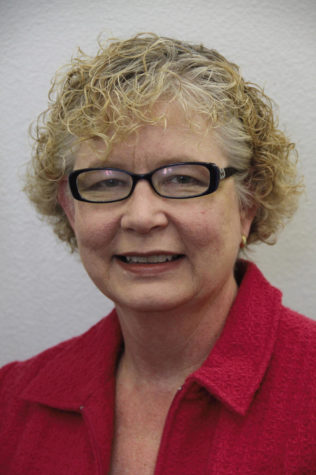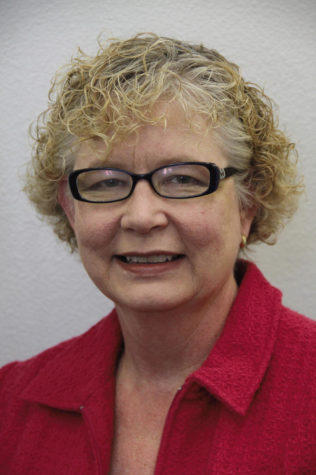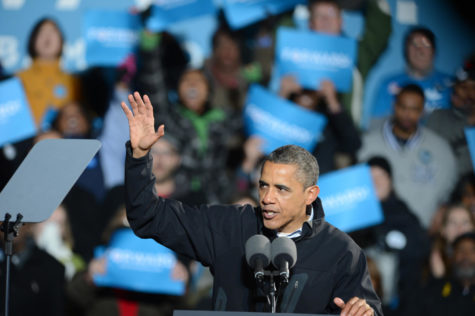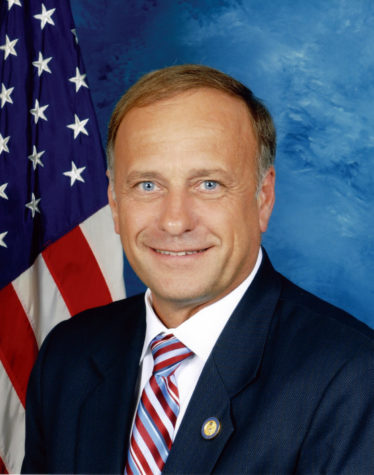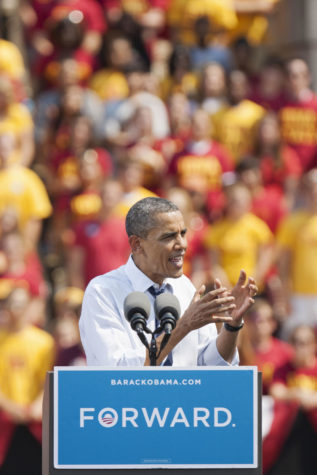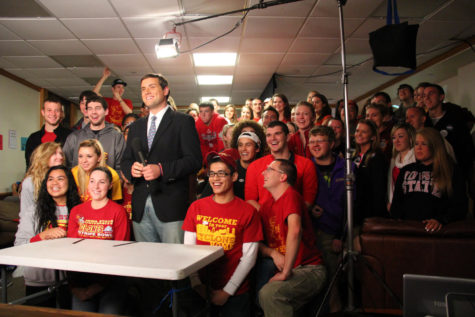2012 election cycle carries reminders of issues from 2008
November 2, 2012
Elections carry certain expectations for voters.
Voters know they will be exposed to numerous speeches, tons of advertisements touting accomplishments and admonishments alike and a certain degree of television exposure both on nightly newscasts and in televised conventions and debates.
However, even when given all these similarities, there are bound to be differences. While the 2012 election campaigns feature some familiar faces from 2008, voters and scholars have noted some marked differences.
“The election is more negative this time around,” said Dianne Bystrom, director of the Carrie Chapman Catt Center for Women and Politics. “It will probably be the most negative campaign in history.”
Bystrom said that in 2008, both campaigns were more positive, particularly in the case of President Barack Obama’s campaign. While both Obama and former Republican candidate John McCain ran their share of negative attack ads, the overall message was more positive and upbeat.
The content of the ads was also slightly different in 2008. Bystrom said content varies with each election, but in 2008 many ads focused on the economy, a trend still seen today in the 2012 cycle.
“In 2008, it was the nation that was tired of eight years of [George W.] Bush and two wars — Iraq and Afghanistan,” said Steffen Schmidt, university professor of political science, in an email. “Also the economy was tanking. In 2012, the issues are jobs, a weak economy that is only slowly recovering and a black president who is not liked or trusted by many voters.”
Schmidt said that in 2008, Obama was dynamic and exciting with his campaign of hope and change. The Republicans’ ticket of McCain and Sarah Palin, however, was perceived as old, and McCain particularly was tied down by a controversial running mate in Palin.
This time around, Schmidt said, Obama is perceived as tired and the “same old thing,” with voters being scared he is a big spender who has increased the national deficit and debt instead of reducing them.
“[2012 Republican contender] Mitt Romney is seen as someone who may try a new approach on the economy,” Schmidt said.
There are also differences in terms of the target demographics, with some shake-up as to what demographics favor a particular candidate.
“There is also more direct targeting in this cycle,” Bystrom. “Particularly targeting women over health care issues and the economy.”
Raeann Ritland, graduate student in journalism and mass communication, also noticed the trend in this cycle targeting the female vote.
“The first time I was able to vote was in 2008, and I remember the target audience for both campaigns being the young, college-age vote,” Ritland said. “This time the female vote is the target. It is a different target, but I am still a part of both groups.”
Ritland said that in 2008, she noticed Obama targeted the youth vote. This time around, she notices both parties are courting the female vote.
Schmidt said that in 2012, Romney has gotten more support from white voters than McCain in 2008 and is also doing better than Obama with independent voters.
Bystrom and Schmidt echoed the sentiment that there are similar trends to 2008 in messages being disseminated by each campaign.
“In 2008, the attacks against Obama were his lack of experience and being more of a celebrity,” Bystrom said. “This time around, they are attacking his performance, particularly around the economy and health care.”
Bystrom said the economy is an important issue in any campaign.
She said voters might have noticed more ads focusing on gas prices and war as they relate to the economy in 2008, but in 2012 they may see more ads focusing on the bailout.
Bystrom went on to say Romney ads attacking Obama focus on what the president carried out in his first term in office.
Schmidt shared these sentiments, saying that in 2008, Obama was seen as having little experience after spending only two years in the Senate. He said Obama was able to convince voters Bush had gotten the United States into an unnecessary and very expensive war in Iraq.
“[In 2012,] Obama is the incumbent and can be blamed — rightly or not — for the current troubles of the country,” Schmidt said. “He is being blamed for the lack of security at the U.S. consulate in Libya that killed four diplomats. The attacks on him are also that he is too socially liberal, pro-abortion and pro-gay marriage.”
Ritland said that while she did not get to watch the first two debates of the 2012 cycle, she caught most of the third debate and was surprised by the content.
“I had heard talk that the debate was supposed to focus on foreign policy,” Ritland said. “But in the debate, Obama and Romney kept coming back to education and other policies like health care. Particularly women and health care.”
Ritland said she also noticed the structure of each candidate’s rhetoric.
“Rather than telling their side, they attack the opposite side,” she said. “It is very partisan.”






